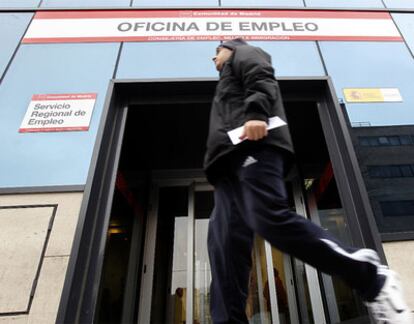December offers some respite after bleak year for job market
Spain ends 2010 with over fifth of its working population remaining idle
Unemployment in Spain fell for the first time in five months in December, but that was scant consolation for the fifth of the working population who remained surplus to employers' needs at the end of what was another bleak year for the nation's economy.
The Labor Ministry said Tuesday that the number of people registered as unemployed fell by 10,221, or 0.25 percent from November. December is normally a bad month for the labor market, particularly for construction and industry, and the secretary of state for employment, Mari Luz Rodríguez, underscored that last month's performance was the best in the past 10 years. Nonetheless, she acknowledged that with over four million people out of work there was no room for a "complacent reading" of the figures.
The number of people registered as unemployed fell by 10,221
The main driver behind the fall in the number of jobless was the services sector, which added 30,409 jobs in the month, while unemployment rose in construction and industry. The number of women out of work fell by 1.72 percent, while the number of unemployed men climbed 1.26 percent.
For the whole of 2010, the number of unemployed rose by 176,470, or 4.54 percent, a figure that Rodríguez pointed out was the "lowest in the past three years." The number of people out of work climbed by 999,416 in 2008 when Spain was hit by the start of its worst economic crisis in decades. The following year saw the ranks of the unemployed swell by a further 794,640.
The figures prompted the secretary of state for social security, Octavio Granado, to proclaim 2010 as "the last year of the crisis." In an interview with local radio station Onda Cero, Prime Minister José Luis Rodríguez Zapatero welcomed the improvement in December but acknowledged unemployment was unlikely to fall significantly this year.
Granado said January and February are likely to be "bad months," but added the administration is sticking by its forecast of the economy being able to generate between 40,000 and 50,000 jobs in the second half of this year.
According to European Union figures, the jobless rate in Spain in October stood at 20.7 percent, more than double the average in the EU. The government expects the economy to grow 1.3 percent this year after contracting an estimated 0.3 percent in 2010 and 3.8 percent in 2009. However, in a report released last month, the OECD forecasts that the economy would grow by only 0.9 percent this year, which should still help bring about a slight drop in the jobless rate to 19.1 percent.
The Labor Ministry also highlighted an 8.6-percent rise in the number of permanent work contracts signed in December compared with a year earlier, the first increase of its kind in the last month of the year since 2006.
The government pushed through labor market reforms earlier this year in an effort to reduce the high percentage of workers on temporary contracts and encourage employers to boost permanent hiring by reducing severance entitlements.
The move infuriated the country's main labor unions and was one of the main reasons behind a national strike held on September 29.

New year "full of uncertainty"
Spanish people have serious concerns about their immediate and long-term future, according to the latest poll conducted by the Center for Social Research (CIS).
Around 44 percent of those interviewed said that 2011 would be "full of uncertainty," while the majority of respondents said that they thought the situation with unemployment, immigration, housing and pensions would only get worse.
Despite the general pessimism, 54.9 percent said that 2010 had gone well or very well for them, while 40.5 percent of the 2,480 people interviewed said they thought that this year would go better.
Tu suscripción se está usando en otro dispositivo
¿Quieres añadir otro usuario a tu suscripción?
Si continúas leyendo en este dispositivo, no se podrá leer en el otro.
FlechaTu suscripción se está usando en otro dispositivo y solo puedes acceder a EL PAÍS desde un dispositivo a la vez.
Si quieres compartir tu cuenta, cambia tu suscripción a la modalidad Premium, así podrás añadir otro usuario. Cada uno accederá con su propia cuenta de email, lo que os permitirá personalizar vuestra experiencia en EL PAÍS.
¿Tienes una suscripción de empresa? Accede aquí para contratar más cuentas.
En el caso de no saber quién está usando tu cuenta, te recomendamos cambiar tu contraseña aquí.
Si decides continuar compartiendo tu cuenta, este mensaje se mostrará en tu dispositivo y en el de la otra persona que está usando tu cuenta de forma indefinida, afectando a tu experiencia de lectura. Puedes consultar aquí los términos y condiciones de la suscripción digital.








































